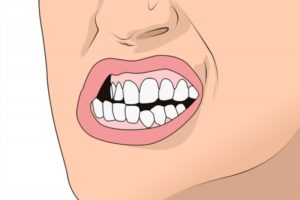 Stress is difficult to manage, especially when you aren’t able to walk away from a situation that triggers you and take time for yourself. Whether you experience it at work or while you’re parenting your children, it can feel impossible to relieve yourself of the tension and anxiety that comes with being overwhelmed. Unfortunately, this can cause your body to develop harmful habits that can impact your oral health and land you an unexpected visit to your dentist in Louisville. Read on to learn how bruxism is harming your teeth.
Stress is difficult to manage, especially when you aren’t able to walk away from a situation that triggers you and take time for yourself. Whether you experience it at work or while you’re parenting your children, it can feel impossible to relieve yourself of the tension and anxiety that comes with being overwhelmed. Unfortunately, this can cause your body to develop harmful habits that can impact your oral health and land you an unexpected visit to your dentist in Louisville. Read on to learn how bruxism is harming your teeth.
What is Bruxism?
Bruxism, also known as grinding and clenching your teeth, is a condition that is said to affect 8 percent of adults in America, according to the National Sleep Foundation. It can be caused by a variety of factors, including bite problems, missing or crooked teeth, sleep apnea, and stress. Because most people grind at night, it’s not uncommon for this condition to go undiagnosed, leaving it to ruin your teeth and make them vulnerable to common oral health problems such as cavities. When you clench your teeth down on each other, it can cause them to wear down your enamel, creating tooth sensitivity, jaw pain, headaches, and a variety of other symptoms that you may notice.
If your bruxism is caused by stress, the best way to reduce the impact of the symptoms is to schedule an appointment with your dentist and take additional measures to put your mind at ease. This can save your oral health and allow you to wake up feeling refreshed rather than in pain or discomfort.
Tips to Reduce Your Stress
There are several ways you can deal with stress. The best way is to be able to spot what situations trigger you and step away from them to take time to yourself by meditating, reading, or doing a relaxing activity. Other ways you can ease your stress are to:
- Cut back or avoid caffeine, alcohol, and nicotine.
- Daily physical activity.
- Get more sleep.
- Try new relaxation techniques such as reciting a mantra.
- Talk to a professional about what you’re going through.
- Keep a journal for your thoughts.
- Manage your time.
- Set boundaries and learn to say “no.”
Protecting Your Mouth From the Harmful Effects of Stress
When you take extra efforts to reduce your stress, you’ll be able to ease the effects of bruxism, and hopefully stop the condition altogether. However, these practices take time that your teeth don’t have. While you’re working on managing your stress, it will be important for you to protect your mouth from nightly grinding and clenching. That’s why you should visit your dentist for a customized nightguard for bruxism. It will help cushion and protect your teeth and facial muscles so you can rest easy knowing that you’re not at an increased risk of damaging your mouth.
About the Author
Dr. Kenneth Bell is passionate about looking after his patients’ health by providing them with a variety of therapeutic and preventive treatments, including nightguards for bruxism and TMJ therapy. He takes a personal and gentle approach with treatments by taking the time to understand what each of his patients is going through. He equips his office with the latest dental technology and stays up-to-date with the most advanced treatments and techniques in the dental world. For questions or to be fitted for a customized nightguard for bruxism, visit Bell Dental’s website or call 502-749-2355.
